Here are the most notable items we came across in the past seven days…
Congestion pricing in NYC: If USDOT Sec Pete Buttigieg can fast-track a congestion pricing plan in New York City, can he can do anything to help move Portland’s effort along?
Safer vehicles: London has implemented a new “Direct Vision Standard” that requires delivery truck operators to adhere to safer vehicle regulations aimed at preventing right-hooks and other types of collisions with non-drivers.
Helmets yes. Helmet laws no: Washington’s largest bike advocacy group has had to more clearly define their stance on helmets and policing in light of an effort to repeal Seattle’s mandatory helmet law.
Vancouver (WA) cycling history: Fun article in The Columbian shares history of a voluntary bike tax that was used to build bike paths in Clark County in the 19th century.
Advertisement
Trucks. Why?: “When all you can do is watch out for yourself and those you love, having a vastly excessive vehicle feels like a damn good disaster plan,” explains the writer of this solid piece in Jalopnik about why people love trucks and big vehicles.
Hugs are cancelled: The UCI, the international sanctioning body for professional cycling, says celebratory, post-race hugs are now banned.
‘Rapha of bikes’: Car designers say their counterparts in the bike industry are leaving a lot money on the table by not offering first-time buyers a higher-quality, well-designed bicycle at a premium price.
Traffic calming and equity: A major new study in London found — despite popular narratives assuming otherwise — that “low traffic neighborhoods” where driving is discouraged do not benefit privileged neighborhoods more.
Keep the boom alive: A U.S. bike industry leader implored Asian suppliers at a major industry event that billions of dollars will be lost if they don’t ramp up capacity to meet Covid-inspired demand.
Bicycling perceptions: National nonprofit People for Bikes commissioned focus group research in 10 cities (including Portland) with an aim to understand why people don’t bike and what would encourage then to do so.
— Jonathan Maus: (503) 706-8804, @jonathan_maus on Twitter and jonathan@bikeportland.org
— Get our headlines delivered to your inbox.
— Support this independent community media outlet with a one-time contribution or monthly subscription.



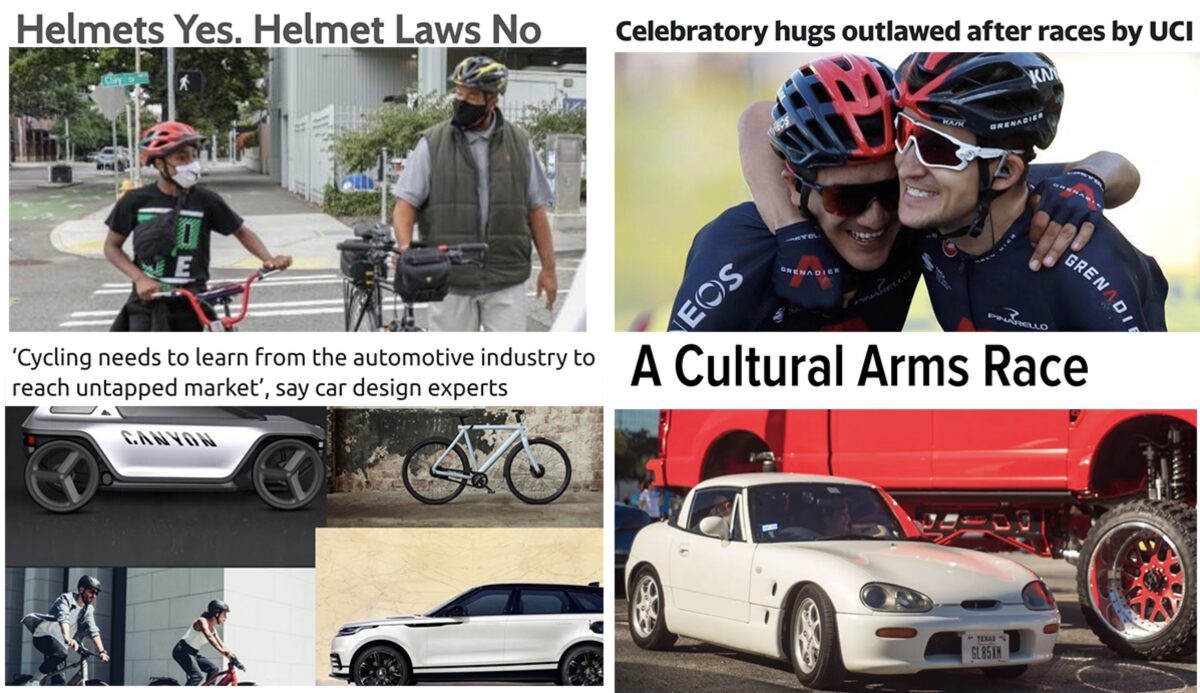
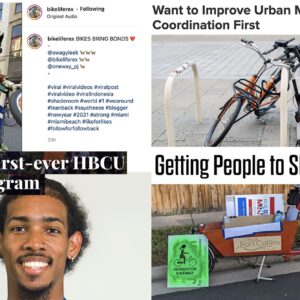
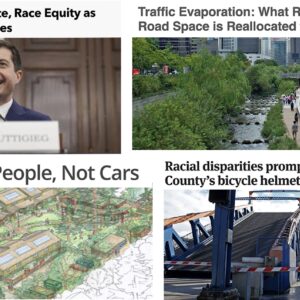
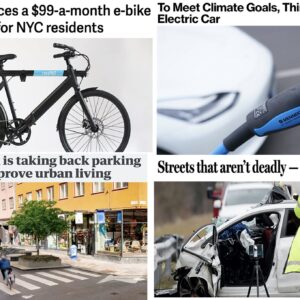
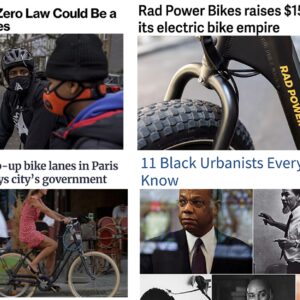
Thanks for reading.
BikePortland has served this community with independent community journalism since 2005. We rely on subscriptions from readers like you to survive. Your financial support is vital in keeping this valuable resource alive and well.
Please subscribe today to strengthen and expand our work.
One of the problems with the, Big Trucks and SUV’s equal safety for your and your family argument, is that if you look at the whole picture it is not true. Last time I looked, only about 1/3 of fatalities and serious injury accidents occurred between two or more vehicles. The majority of deaths and injuries occur with vehicles striking objects or leaving the road and rolling over. In these accidents pickups and big SUV’s ( especially body on frame models like suburbans) have three strikes against them. First, they handle worse than cars so they are more likely to lose control at speed or leave the road, second, they have a higher center of gravity and tend to roll over more easily and third when they roll over they offer less topside crush protection. It might help things if we could get some kind of public service adds that highlight this for the prospective ( give me safety and heck with the others) car buying crowd.
You are correct. While increasing your vehicle’s mass does incrementally improve your own safety in a collision with another vehicle – strictly by shifting more of the energy of a collision to them – it proportionally decreases the safety of others more. Put more briefly, others lose more than you win.
In the future we will all have either a single-cylinder Messerschmitt KR200 or a massive lorry, at which point we will finally be living in the movie Brazil.
“In these accidents pickups and big SUV’s ( especially body on frame models like suburbans) have three strikes against them.”
Are there any statistics to support that?
Pretty much all of them. Just go to IIHS.org.
If anyone had any doubts whether or not our society has gone completely insane, a hug ban over an infectious disease that almost exclusively affects the obese should pretty much settle that question.
But just because I don’t want to be all negative here, I applaud Buttigieg’s efforts to bring congestion pricing to New York as fast as possible.
Obesity is a big driver of adverse outcomes but it is also impacting the elderly disproportionally. Wearing masks and keeping distance saves lives and reduces the transmission for everyone. https://www.cnbc.com/2021/03/08/covid-cdc-study-finds-roughly-78percent-of-people-hospitalized-were-overweight-or-obese.html
The small print at the end of the article you cited:
“The study had limitations, the CDC said. Risk estimates for severe Covid-19 were measured only among adults who received care at a hospital. Therefore, these estimates might differ from the risk among all adults with Covid, the CDC said. Additionally, only patients with reported height and weight information were included in the report.”
Correlation does not necessarily equal cause. Of the 500,000 deaths, what if only 50,000 actually got weighed? And only a subset actually died in a hospital rather than a nursing home or at home?
Early in the pandemic I saw a BBC report that British nurses hated dealing with obese patients because they often hurt their backs while turning the patient over. Perhaps heavy and big people were weighed more often, to help prevent back injuries for nurses?
It’s often incomplete reports like this one where less than useful or even false information gets spread so easily. We have no idea if obesity has anything to do with covid-19, death rates, spread, or whatnot. Nothing physiological has yet been proven.
https://www.cnn.com/2021/03/04/health/obesity-covid-death-rate-intl/index.html
I’m the ideal weight for my height. I have 4 bikes in my stable and regularly ride for both fun and commuting. I came down with COVID in December. While not the worse flu like illness I have suffered in my life, it was no walk in the park and it left me with heart arrhythmia to this day. I already had one heart test and just sent off a heart monitor I wore for the previous 2 weeks to get analyzed.
People who are smug about what COVID is and does are just communicating to the rest of us that they don’t understand what the phrase “novel virus” means. It means that we literally knew NOTHING about this virus until it started killing humans. While we have learned a lot in the past year, we still don’t fully understand the toll that it takes on survivors. So UCI is being the adult in the room here.
Plus, it’s widely known that pro cyclists tend to have rather depleted immune systems due to the physical demands of being on a bike for so many hours combined with trying to keep their weight so low. They still may not be as likely to suffer serious effects but any prolonged reduction in lung/heart efficiency can ruin a rider’s season.
Not to mention how many have asthma and need inhalers.
If you care about athletic performance (for activities like cycling), you should be really careful to avoid Covid. Many people have reported very long-lasting effects from it, and some still have not recovered. It isn’t just the elderly and obese who need to worry about this, and we all need to be careful so we can avoid the spread (at least until we have sufficient levels of vaccination to reach herd immunity).
It’s good that People for Bikes is going to collect more data, but it is already abundantly clear why people don’t bike on the roads more: They are terrorized by the threat of serious bodily injury or death caused by people operating motor vehicles in the same road space.
Until people no longer legitimately fear using the public transportation space, we will not have an equitable society, and we will continue to have only the brave or foolhardy (I could myself among the latter) plying the roads on two wheels.
And, I have to say, after two decades of closely following US transportation policy and practice, it seems to me that no meaningful progress is being made toward this goal. And the reason is the same that no meaningful progress is being made toward other critical policy goals (eg, mitigating climate change impacts): The political power has been captured by corporate interests who benefit from the status quo.
Clearly you haven’t read the report.
Corporate interests and the rich who own or invest in those interests are certainly to blame but the Fordist capitalist consumer also shares blame.
(Boycotts, strikes, divestment, and anti-Fordist direct action are powerful tactics that are often undermined by assigning all, or most of, the blame to a few corporations.)
What do you mean by anti-Fordist? Genuinely interested as it isn’t a term I’m familiar with and google doesn’t bring up much. Fordist, Fordism and Post-Fordism but not much on anti-fordist.
When someone says that something is “abundantly clear” I am left with the feeling that that person has no interest in hearing any opinions other than their own.
I also want to comment on the post-race hug ban by the UCI. And I say this as a pro-mask, pro-vaccine, pro-emergency-government-intervention citizen.
The lockdown era has to end. It has been a year, and people cannot take it anymore. And, yes, this includes things as simple and meaningful as a post-race hug. The psycho-social and economic impacts have already been immense, and they simply cannot continue indefinitely.
It’s time for the government to step-up with contact tracing, vaccination, increased funding for medical resources in addressing the pandemic, and isolation assistance for vulnerable people. They’ve had a year to get it together.
End the lockdown. Bring back hugs. Do your job, government “leaders”.
Amen–re contact tracing I think that state governments should use a little blackmail on restaurant and bar owners, i.e., you can be as open as you want for as many patrons but you are going to contact-trace if you ever want a food or liquor license again to do business with!
Our problem is that we went down a bad road when we shifted our health care system from a “public health” model to a privatized “pay for treatment of symptoms” model. There were three ways to deal with the pandemic on a national level. Small isolated countries (like Taiwan or NZ) could do an external lockdown of travel and enjoy things mostly open internal. Countries with a robust public health care system could isolate the vulnerable, have big testing programs and quarantine the sick in public facilities while boosting vitamin deficiencies, and using effective treatments early in the infection cycle ( Cuba and Mongolia are good examples of this model). We could choose neither of these solutions as we are too big for the Taiwan model and we gutted our public health system many decades ago, and gave the privatized health care industry enough political power to quash any attempts to circumvent it with public process’s. So we ended up with the worst of all worlds, and can only cross our fingers and hope the vaccines work out.
I love this hot take so much. The reason we can’t hug is because Americans couldn’t do basic things to keep each other safe. Now, when we are close to out of the woods we have fools advocating for killing a couple hundred thousand more Americans because they can’t wear a mask for an extra month or two.
An extra month or two becomes six months then becomes another year then becomes forever wearing a mask. The fear mongers of Team Covid would love to keep this thing going as long as possible. It’s become a golden age for the authoritarians. People who had no power before are now “heroes” for chastising people who don’t share their level fear and love of fear mongering. The governor even encourages you to tattle on your neighbors. You’re wearing your mask wrong! You’re not wearing a mask on your bike! Your dog is not wearing mask! You’re not following the arrows on the floor! You didn’t bathe in hand sanitizer! You should hide under the bed! What will become of these people post Covid? They won’t know what to do with themselves.
Who’s in lockdown? No one in America, certainly.
You can’t wait a few months for the population to reach herd immunity levels? My 5 year-old understand this concept, at least.
No, you missed my point. I’m fine with complying with science-based behavioral restrictions to protect myself as well as others. That can no longer be the only tool used to control the contagion. Authorities need to step up and implement other measures so that it’s no longer necessary to distance at every moment. For example, racers should pass tests to race, making distancing irrelevant.
The government has the right to trammel rights in emergencies, but it doesn’t have the right to rely on restricting free association indefinitely, and it has the obligation to use other measures to mitigate the impact on civil liberties.
I want to echo the impact of the psycho-social impact. The mental health impacts of living alone and working alone are real and immense. It hurts to be in a world where you can’t see friends, you can’t do a group ride and you spend life in what feels like perpetual solitary confinement.
I stay home, I wear a mask, I don’t socialize. I’m acting responsibly but damn is it taking a toll.
I really have to say that comments like “Chris I” are extremely unhelpful. The virus is real and has caused mass suffering. The pain of isolation is also real and causing mass suffering, especially for those of us who live alone.
Comparing a desire to get out of this to not having the comprehension of a 5 year old is sanctimonious, uninformed, and hurtful. Please check that self righteousness for a minute and have some damn empathy.
I’m in the same boat, VS. I feel you.
It’s just me and my spouse here at the house, working in different rooms each day. Entertainment here at the house in the evenings and weekends. And a trip to the grocery store each fortnight on a weekday morning. Next week, it will be a year that I’ve been doing this routine.
And, believe it or not, I’m not complaining. I just know that I can’t keep doing it for much longer, and I, like everyone else, deserve to have some clear indication of when the government will be using its other tools to bring all the social isolation to an end.
Fortunately, I am “stuck” at the edge of the British Columbia wilderness, where I can bike, paddle, snowboard, and hike whenever I want. I have it so much better than most, and I have so much gratitude for that, and the least I can do is help protect others.
I really feel for the younger people. I think about what it would have been like to have this disrupt my college education, or if it had come at a time when I was courting my spouse, when we were living in different cities. It’s indescribably awful, and literally killing people. The pundits really tend to underestimate the psychological impacts of this, but it is the greatest mental health crisis in a generation, and will define people for the rest of their lives.
For me, the impact is hopefully minor. I am not sure whether I will even be able to go into a crowd again, at a race, or a concert, or a ballgame. Ever since I nearly died of pneumonia in early 2019 and got a taste of what it’s like to get Covid, I get extremely nervous when I am close to people I don’t know. Am I developing agoraphobia? Millions in the US will. Only compassion will help them.
For me, I’ve got to start seeing my friends and my family again. I’ve got to take some trips. I’ve got to cross the border again to do business.
Contact tracing stops the spread. Vaccines stop the spread. Testing before gathering stops the spread. They just played an entire NFL and NBA season with millions of hug-equivalents. We have the resources to do the same for us plebes as well. We have the technology.
Let’s get on with it!
I love that the article about Seattle’s helmet laws links to this Phil Gaimon video:
“Please Share This When I’m Killed by Someone Driving a Car” https://www.youtube.com/watch?v=yQO4Dnlwcg0
The “People” for Bikes survey found that Portlanders had the lowest share of utility bike trips of any other city by a large degree. The survey is not scientific but it reinforces my perception that transportation cycling in Portland is in decline (I hope I’m wrong.)
Utility cycling percentage:
Portland: 9%
New Orleans: 45%
Austin: 38%
Denver: 38%
Baltimore: 25%
Memphis: 17%
NYC: 17%
Recreational cycling percentage:
Portland: 55%
New Orleans: 36%
Austin: 38%
Denver: 31%
Baltimore: 46%
Memphis: 48%
NYC: 50%
“not scientific” is a huge understatement. Not only was it less than a dozen people, they were not people who bike much at all. It’s awesome to get their perceptions, but trying to draw any conclusions from this is very risky. And of course they don’t bike for transportation if they don’t really bike much at all. That makes total sense.
It was still a comparison between cities. It will be interesting to see if the sharp decline in commute cycling in Portland accelerates in coming years.
As for unscientific being an understatement, I would be hard pressed to list even a fraction of the stories published here that focused on anecdotal surveys or studies.
Most researchers tend to look at sample size of n=100 at the very minimum for any meaningful result. Comparing the data is close to meaningless.
“Portland, on the other hand, had the highest bike-to-work ridership score among the ten cities; however, its focus group had the lowest share (9%) of participants who rode for utilitarian purposes”
Keep the Boom Alive: Why are companies like Specialized no longer making bike parts themselves? I still have and use an old 1980s Specialized 177.5 triple crankset. If they want parts makers to ramp up production, they also need to make parts themselves. And they need to help refurbish and recondition (i.e. recycle) old bikes and help local shops that do so.
I don’t think specialized made those cranks. They probably contracted with a Japanese or Taiwanese company. Specialized basic business model in the 80s at least was copy/contract small US builders, Ritchey, Joe Breeze or Merz and produce frame designs at scale in Asia with parts from various Asian venders.
“the cranks were manufactured for Specialized by Sugino“
http://bikeretrogrouch.blogspot.com/2016/01/old-is-good-specialized-triple-cranks.html?m=1
“Hug ban” wow. What will the crosswalk monitors take next? High fives?
I dunno, seems pretty reasonable to me actually. Outdoor cycling as an activity has been deemed relatively safe. Hugging, not as much.
If organizers can require helmets at all times while at a race venue, why wouldn’t they be equally concerned about observing Covid-19 safety protocol? Imagine the negative impact for the promoter if a race becomes a spreader event.
What about Christian Side Hug?